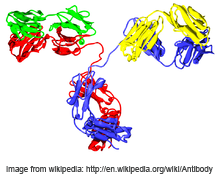The following post was contributed by the Developmental Studies Hybridoma Bank.
 Antibodies are the most widely used class of protein-binding reagents. In the lab, their binding specificity allows scientists to target proteins of interest for labeling, quantification, purification, chromatin immunoprecipitation and more. The Developmental Studies Hybridoma Bank (DSHB), directed by David R. Soll, is a repository for monoclonal antibodies, distributing over 3,000 antibodies and associated hybridoma cell lines.
Antibodies are the most widely used class of protein-binding reagents. In the lab, their binding specificity allows scientists to target proteins of interest for labeling, quantification, purification, chromatin immunoprecipitation and more. The Developmental Studies Hybridoma Bank (DSHB), directed by David R. Soll, is a repository for monoclonal antibodies, distributing over 3,000 antibodies and associated hybridoma cell lines.
The DSHB was created by the National Institute for Child Health and Human Development (NICHD) in 1986, to enable basic research by banking and distributing monoclonal antibodies at cost. We distribute over 65,000 antibody units per year from our facility at the University of Iowa. The minimal fees from distribution funds our operation.
Antibodies are glycoproteins that are part of the humoral immune system. They recognize antigens on foreign invaders, such as bacteria or viruses, which results in neutralization or targeted destruction. Antibodies are composed of two light chains and two heavy chains. The ends of the branches contain the antigen binding sites and are highly variable, allowing exquisite specificity. This characteristic allows monoclonal antibodies to be used as a powerful reagent in the laboratory.
The DSHB focuses on monoclonal antibodies, which are each produced by a single B cell. To create a monoclonal antibody cell line, myeloma cells are fused with activated B cells from the spleen of mice injected with the antigen of interest. The immortalized cells, called hybridomas, are individually isolated and expanded. The clonal cells are screened to identify hybridoma lines, each producing a monoclonal antibody against a target antigen. This contrasts with polyclonal antibodies, which are mixtures of monoclonal antibodies obtained from serum.
Our most popular monoclonal antibodies include those directed against human transcription factors such as PAX7, PAX6, AP-2 alpha and ISLET-1. In addition, we distribute monoclonal antibodies against popular fluorescent proteins (GFP and YFP) and protein tags (c-MYC and HA).
We have also created the Monoclonal Antibody Research Institute dedicated to: 1) developing new ways of generating antibodies, for example through the use of less toxic adjuvants; 2) generating complex antibody chips that allow assessment of many protein targets in a single sample; 3) producing recombinant, partially humanized rabbit antibodies that exhibit increased avidity to high profile antigens; and 4) generating mAbs against new cancer biomarkers.
We believe that repositories, such as Addgene and the DSHB, play an important role in scientific exchange. In addition to ensuring affordable access to materials, repositories provide standardized quality-control and technical support to the community.
Thanks to Our Guest Blogger!
 David Soll has been the Director of the Developmental Studies Hybridoma Bank (DSHB) since 1996.
David Soll has been the Director of the Developmental Studies Hybridoma Bank (DSHB) since 1996.
Topics: Scientific Sharing, Material Sharing






Leave a Comment